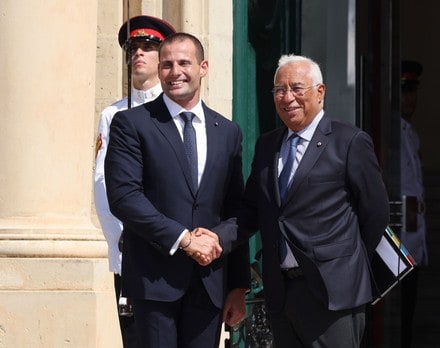
Photo: Domenic Aquilina/ EPA-EFA/Shutter stock
That’s what he said was on his mind, when Antonio Costa, until then the socialist prime minister of Portugal,resigned from his post yesterday. “The dignity of the functions of prime minister is not compatible with any suspicion about his integrity, his good conduct and even less with the suspicion of the practice of any criminal act,” Costa told reporters yesterday.
Antonio Costa secured a majority for his party in parliament at snap elections in 2022, an impressive achievement given how difficult it is for a single party to win so resoundingly in Portugal. That success emerged from an earlier term in successful coalition government.
Costa is credited with improving the economic conditions of his country, particularly the formerly depressed tourism sector. He is, or was, electorally popular, enjoyed parliamentary support, and economically successful.
But since the beginning of this year his government has been plagued by a series of corruption scandals. One of them was over a junior minister in his government who had collected a sizeable sum of money from the failing state-owned airline before she got another public service job.
The scandals that ended his political career were about mining permits and a hydrogen project. His chief of staff was arrested this week and he, the prime minister, has been named by prosecutors as a subject of their investigation.
No crime has been proven in a court room yet and Antonio Costa says that he’s innocent. But “the dignity of the functions of prime minister is not compatible with any suspicion,” he said as he left. That may be a gesture of conscience, or it may be the product of the political culture in his country and the powers the president of Portugal enjoys. Either way, however, it is a consequence of the prosecution service saying they were investigating the prime minister and searching for evidence in his home.
When the prosecution started investigating the case, Antonio Costa was prime minister. When they arrested his chief of staff, he was prime minister. When they raided his home, he was prime minister. To them it didn’t matter that he was the prime minister. The consequences to him of what they were doing were not their problem.
This isn’t miraculous. Portugal is not some utopic paradise I’m comparing Malta to. And yet the notion of prosecutors openly announcing an investigation into a prime minister feels positively fantastical. I was reminded as I read about this that even for Malta this wasn’t always so impossible to imagine.
Today we would not conceive of Peter Grech or Victoria Buttigieg prosecuting ministers or Angelo Gafà or his several predecessors who succeeded John Rizzo as chief of police confirming that a minister was the subject of their investigation. It would be like imagining a 6-year-old making bishop. But it wasn’t always like this.
I was barely starting out, just a couple of years out of college, when I was walking to my car at the end of a day at work at my desk in the Auberge de Castille. At the time, my boss, Austin Gatt, had an office as a government minister on the first floor of that building, somewhere beneath the prime minister.
Two people, a man, and a woman stopped me as they identified themselves as police officers. They asked me where I worked. I told them I was a policy advisor to a government minister. They asked me to produce my ID card. I did. And they let me go.
Late that evening my boss called me to go see him in Parliament. When I got there, he told me, in his notoriously unfussy way, that he wanted me to review his draft of his letter of resignation before he would go to his boss, the prime minister, to hand it in.
Eventually he filled me in with what had happened. The police had come to his office in Parliament and sealed the room were his diary assistant used to work. They took computers and documents as part of an investigation into suspicion that the minister’s diary assistant was cashing personal cheques in the informal market.
Austin Gatt fired his diary assistant on the spot just before handing in his resignation. His boss, Eddie Fenech Adami, rejected Austin Gatt’s resignation and he defended his minister when Parliament met to debate a motion of no confidence in Austin Gatt filed by the opposition over the incident. The argument was that the police’s case against Austin Gatt’s diary assistant did not include any suggestion of bribery or abuse of office. It had nothing to do with government at all.
We can have a debate about whether Austin Gatt’s resignation should have been accepted that day or Parliament should have kicked him out. But it’s not the point I want to make.
The point I want to make is that the police didn’t think twice about searching a government office, lifting computer equipment from a government ministry, and causing whatever collateral political damage which was a consequence of their investigation into the suspicion of a crime. There was a time when this is how things worked, even in this country.
You see, there are two ways at looking at the statement “the dignity of the functions of prime minister is not compatible with any suspicion of a criminal act.” One way to look at it is that once the suspicion occurs, the matter is investigated just as if the suspicion raised was of a crime committed in a notorious crime spot. It is then up to the politicians to ensure that they do not allow their sullen reputation to damage the dignity of the office they occupy.
And then there’s Angelo Gafà’s way of looking at that statement, and that is that no matter the evidence, criminals in political office are best left alone.